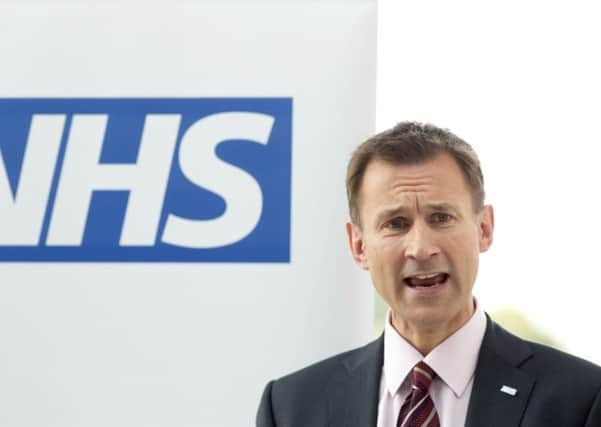Patients ‘failed’ by squeeze on GP funding


Just 24 hours after the Health Secretary Jeremy Hunt pledged a “return to the old-fashioned values of family doctors” through a new contract between GPs and the Government, the Royal College of General Practitioners (RCGP) claims spending cuts are compromising the standard of care GPs can offer patients.
The proportion of the NHS budget spent on general practice in England in 2004/05 was 10.6 per cent, compared with 8.5 per cent in 2011/12, an analysis by the RCGP and the National Association for Patient Participation (NAPP) reveals. The results are longer waiting times and increasing pressure on hospitals, GPs say.
Advertisement
Hide AdAdvertisement
Hide AdBut the new GPs’ contract with the Government focuses on keeping more patients out of hospital, Mr Hunt said. Every person aged 75 and over will be assigned a named, accountable GP to ensure that patients receive co-ordinated care, and GPs will take on more responsibility for out-of-hours care, with a commitment to monitor the quality of out-of-hours services used by their patients.
“I think this is what GPs really want,” Mr Hunt told BBC Breakfast.
“They became GPs because they want to deliver personal care that really looks after their patients. They didn’t want to do all this box-ticking and bureaucracy and target-chasing. I think this is a return to the old-fashioned values of family doctors and I think both patients and doctors will see this as a big step forward.”
Concerns have been raised over the quality of out-of-hours care since a 2004 GP contract enabled family doctors to opt out of night and weekend care by sacrificing £6,000 a year in salary.
Advertisement
Hide AdAdvertisement
Hide AdMr Hunt said the new measures were the “first step in reversing” these “disastrous changes”.
“We can’t do it all at once, it’s a big, big change, but I think we need to start with these groups of people who are the most vulnerable,” he added.
“Really, what I want this to be is a much bigger change, so that everyone feels when they contact their GP they’re talking to someone that knows about them and their family.
“I think what patients really want is someone who really knows them, knows their condition, knows their family, knows what they went into hospital about last year, and can therefore deliver them better tailored, personalised care.”
Advertisement
Hide AdAdvertisement
Hide AdBut the numbers fail to add up, according to RCGP chairman Dr Maureen Baker, who said: “During the last nine years, GPs across the country have had to cope with a growing and an ageing population, in which more and more people have been affected by multiple, serious long-term conditions – and yet funding for general practice has been slashed.
“On the one hand, the people who run the NHS across the UK say they want more people to be cared for in the community. On the other, resources have relentlessly drifted away from community-based health services towards more expensive hospital-based care.
“The flow of funding away from general practice has been contrary to the rhetoric and has happened in the absence of any overall strategy as to how we spend the NHS budget.
“The share of the NHS budget spent on general practice has slumped to the lowest point on record.
Advertisement
Hide AdAdvertisement
Hide Ad“The various NHS bodies and governments who decide how we divide the NHS funding cake in the UK have inadvertently allowed a situation to develop in which funding for general practice is being steadily eroded.
“With services now at breaking point, it’s time to come up with a plan to turn the tide.”
The RCGP and NAPP are launching a new campaign, Put Patients First, Back General Practice, calling on Ministers to increase NHS spending on general practice across the UK to 11 per cent by 2017.
The British Medical Association (BMA), which negotiated the new GP contract on behalf of doctors, maintain that the changes will improve conditions for GPs by cutting unnecessary targets, reducing paperwork and giving doctors more time to focus on their patients’ needs.
Dr Chaand Nagpaul, chair of the BMA’s GP committee, said: “Our agreement will deliver real benefit to patients and build on the work already carried out by GPs.”